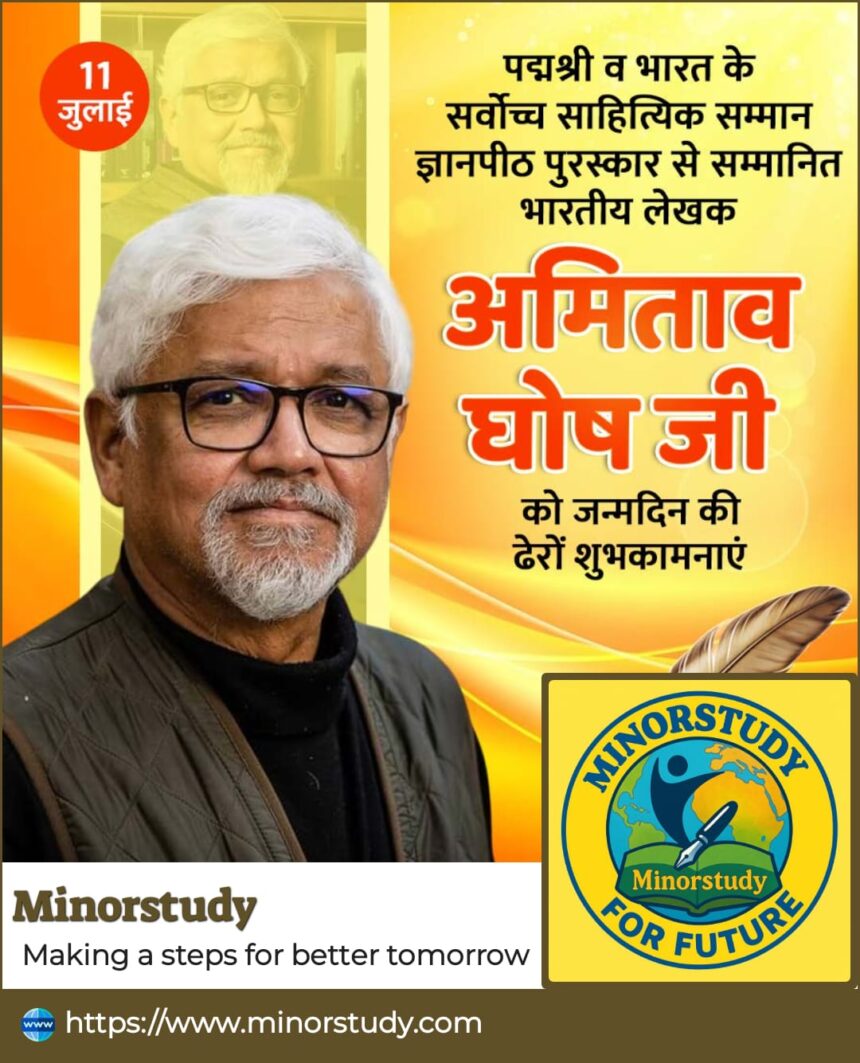✨ 7 Powerful Milestones from Amitav Ghosh’s Life That Redefined Indian Literature
In the rich tapestry of modern Indian literature, few names shine as luminously as Amitav Ghosh. With his intellectual depth, narrative mastery, and global perspective, he has emerged as one of India’s most celebrated authors whose work transcends borders, genres, and generations.
- 🧬 Who is Amitav Ghosh?
- 🕰️ Timeline of Key Events
- 📚 Literary Contributions and Themes
- 1. Colonialism and Migration
- 2. Memory and Identity
- 3. Globalization and Diaspora
- 4. Environmental Advocacy
- 📊 Important Facts About Amitav Ghosh
- 🤔 Frequently Asked Questions (FAQs)
- Q1: What is Amitav Ghosh best known for?
- Q2: What awards has he won?
- Q3: What is the Ibis Trilogy?
- Q4: Is he only a fiction writer?
- Q5: How has he impacted Indian society?
- 📖 Observance and Literary Significance
- ✨ Impact on Daily Life and Thought
- 🌟 Key Takeaways
- 🙏 Wishing the Literary Giant
- 🌍 Importance in Society
- 🧠 Conclusion: Why Amitav Ghosh Truly Matters
From weaving historical epics to spotlighting ecological crises, Ghosh has redefined the role of a writer — as not just a storyteller, but also as a social thinker, climate activist, and cultural commentator.
Let’s explore the life, timeline, works, significance, and lasting impact of Amitav Ghosh in this in-depth tribute.
🧬 Who is Amitav Ghosh?
Full Name: Amitav Ghosh
Born: July 11, 1956, in Kolkata, West Bengal, India
Nationality: Indian
Genres: Historical fiction, postcolonial literature, ecological writing
Notable Works: The Shadow Lines, The Glass Palace, Sea of Poppies, The Great Derangement
Amitav Ghosh is known for his ability to blend fact with fiction, often exploring themes like colonialism, migration, memory, identity, and climate change.
🕰️ Timeline of Key Events
| Year | Milestone |
|---|---|
| 1956 | Born in Kolkata |
| 1978 | Graduated from St. Stephen’s College, Delhi |
| 1982 | Received Ph.D. in Social Anthropology from Oxford University |
| 1986 | Published debut novel The Circle of Reason |
| 1988 | Released The Shadow Lines, awarded Sahitya Akademi Award |
| 2000 | The Glass Palace published, bringing international acclaim |
| 2008 | Began the Ibis Trilogy with Sea of Poppies |
| 2016 | Released The Great Derangement (non-fiction on climate change) |
| 2018 | Became the first English-language writer to win the Jnanpith Award |
| 2021 | Released The Nutmeg’s Curse, a powerful ecological and historical essay |
📚 Literary Contributions and Themes
1. Colonialism and Migration
Books like Sea of Poppies and The Glass Palace explore colonial trade, indentured labor, and displacement — giving voice to the forgotten.
2. Memory and Identity
In The Shadow Lines, Ghosh explores personal memory vs national history, beautifully dissecting the borders between people, countries, and ideologies.
3. Globalization and Diaspora
His work reflects the cross-pollination of cultures, from India and Burma to Egypt and Mauritius.
4. Environmental Advocacy
Through The Great Derangement and The Nutmeg’s Curse, Ghosh reveals how climate change is deeply intertwined with colonialism and capitalism.
📊 Important Facts About Amitav Ghosh
🏆 First English-language writer to receive the Jnanpith Award (2018).
🌍 His novels are translated into over 30 languages.
📚 His Ibis Trilogy is considered a masterpiece of historical fiction.
🧑🏫 He has taught at Harvard, Columbia, and the University of Delhi.
🌱 He is a vocal advocate for climate change awareness.
🧠 His research-intensive fiction often includes anthropology, botany, and geography.
🏛️ Recipient of India’s Padma Shri in 2007.
🤔 Frequently Asked Questions (FAQs)
Q1: What is Amitav Ghosh best known for?
He is best known for his historical novels, especially The Shadow Lines and Sea of Poppies, as well as his climate change commentary.
Q2: What awards has he won?
Amitav Ghosh has received:
Jnanpith Award (2018)
Padma Shri (2007)
Sahitya Akademi Award
Prix Médicis étranger (France)
Arthur C. Clarke Award (nomination)
Q3: What is the Ibis Trilogy?
A three-part series — Sea of Poppies, River of Smoke, and Flood of Fire — that examines the Opium Wars and colonial trade in the 19th century.
Q4: Is he only a fiction writer?
No. Ghosh has also written essays and non-fiction, especially on topics like climate change, environmentalism, and global history.
Q5: How has he impacted Indian society?
He has:
Raised awareness of historical injustices,
Promoted literary excellence in global circles,
Advocated for climate action, and
Shown how literature can be used for societal transformation.
📖 Observance and Literary Significance
Though there isn’t an official “Amitav Ghosh Day,” his birthday — July 11 — is an opportunity for literary lovers to reflect on critical environmental and historical narratives.
Schools, colleges, and literary groups often:
Host book readings or panel discussions on his work.
Include his novels in curriculum.
Use his writings for climate education and postcolonial studies.
✨ Impact on Daily Life and Thought
Amitav Ghosh’s writing leaves a deep imprint on readers’ consciousness. Here’s how:
🌱 Environment: After reading The Great Derangement, readers begin questioning their ecological choices.
📜 History: His novels reshape how Indians see the British Raj and colonial trade, showing empathy for the oppressed.
🧭 Identity: Ghosh encourages people to embrace cultural plurality, challenging borders of thought.
🗣️ Activism: His work has inspired young scholars and writers to speak against injustice and research deeply.
🌟 Key Takeaways
Amitav Ghosh is a rare blend of storyteller, historian, anthropologist, and activist.
His fiction isn’t just entertaining — it educates, enlightens, and empowers.
He has brought Indian historical and ecological narratives to the global stage.
Ghosh continues to be a moral voice in literature — urging society to look beyond itself.
🙏 Wishing the Literary Giant
“To the man who made fiction factual and facts poetic — Happy Birthday Amitav Ghosh Ji. May your words continue to light the path toward justice, awareness, and harmony.”
“Your writing is not just prose; it is a bridge between generations, geographies, and global issues. Thank you for awakening minds.”
🌍 Importance in Society
In an era of social media noise, Ghosh stands tall as a calm, thoughtful intellectual. His relevance extends to:
📖 Academia – as a case study for postcolonial and ecological literature.
🧠 Public Policy – especially around climate justice and colonial reparations.
📺 Media and Journalism – where his insights are cited on global platforms.
🏫 Youth Education – as an example of intellectual courage and cultural pride.
🧠 Conclusion: Why Amitav Ghosh Truly Matters
Amitav Ghosh is not just an author. He is a custodian of forgotten histories, a critic of ecological apathy, and a beacon for global literary excellence.
He urges us to question linear history, embrace interconnectedness, and be aware of our actions as global citizens.
Whether you’re a student, writer, policymaker, or casual reader — Ghosh’s work reminds us:
“The world is not a place to consume — it is a story to understand.”








